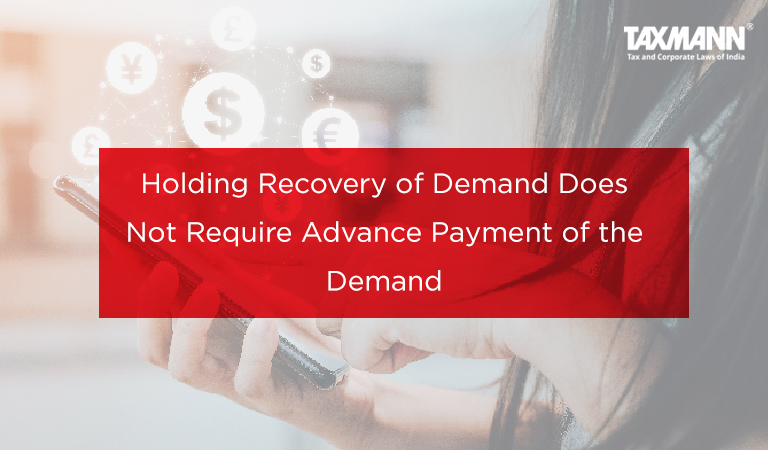Holding Recovery of Demand Does Not Require Advance Payment of the Demand
- Blog|News|Income Tax|
- 2 Min Read
- By Taxmann
- |
- Last Updated on 9 February, 2023

Case Details: Dabur India Ltd. v. Commissioner of Income-tax (TDS) - [2023] 146 taxmann.com 315 (Delhi)
Judiciary and Counsel Details
-
- Manmohan & Ms Manmeet Pritam Singh Arora, JJ.
- M.P. Rastogi, Manu K. Giri & K.N. Ahuja, Advs. for the Petitioner.
- Puneet Rai, Sr. Standing Counsel & Ms Adeeba Mujahid, Adv. for the Respondent.
Facts of the Case
Assessee-company distributed goods as free samples to its stockists under sales promotion scheme treating it as a trade incentive. Upon scrutiny, the Assessing Officer (AO) contended that the free samples distributed are considered as brokerage/commission under section 194H and non-deduction of such tax depicted the assessee as “assessee-in-default”.
Consequent to such an order, the assessee preferred an appeal to the CIT(A) for granting a stay of the demand. However, such stay application was dismissed by the authority vide a non-speaking order based on the reason that the assessee didn’t pay the required 20% pre-deposit of the disputed demand and did not produce any cogent reasons for such non-payment.
Subsequent to such dismissal, the assessee filed a writ petition to the Delhi High Court.
High Court Held
The Court held that the pre-requisite of payment of 20% of the disputed demand is not a necessary requirement during the first appeal in all cases. This requirement can be waived in certain cases if required.
Further, a reference was made to the Office Memorandum dated 29th February 2016 in which it was pointed out that the additions were deleted by the higher authorities on the same issue and the appeals were decided in favour of assessee.
In the present scenario, the stay application was dismissed by the authority by a non-speaking order. Also, the three basic principles were neglected i.e., the prima facie case, the balance of convenience, and irreparable injury.
Therefore, the matter was remanded back to the CIT(A) for fresh consideration and ordered to provide personal hearing to the assessee.
List of Cases Reviewed
-
- Pr. CIT v. LG Electronics India (P.) Ltd. [2018] 18 SCC 447 (para 7) followed.
List of Cases Referred to
-
- CIT v. Jai Drinks (P.) Ltd. [2011] 10 taxmann.com 115/198 Taxman 271/336 ITR 383 (Delhi) (para 3)
- Pr. CIT v. LG Electronics India (P.) Ltd. [2018] 18 SCC 447 (para 7).
Disclaimer: The content/information published on the website is only for general information of the user and shall not be construed as legal advice. While the Taxmann has exercised reasonable efforts to ensure the veracity of information/content published, Taxmann shall be under no liability in any manner whatsoever for incorrect information, if any.

Taxmann Publications has a dedicated in-house Research & Editorial Team. This team consists of a team of Chartered Accountants, Company Secretaries, and Lawyers. This team works under the guidance and supervision of editor-in-chief Mr Rakesh Bhargava.
The Research and Editorial Team is responsible for developing reliable and accurate content for the readers. The team follows the six-sigma approach to achieve the benchmark of zero error in its publications and research platforms. The team ensures that the following publication guidelines are thoroughly followed while developing the content:
- The statutory material is obtained only from the authorized and reliable sources
- All the latest developments in the judicial and legislative fields are covered
- Prepare the analytical write-ups on current, controversial, and important issues to help the readers to understand the concept and its implications
- Every content published by Taxmann is complete, accurate and lucid
- All evidence-based statements are supported with proper reference to Section, Circular No., Notification No. or citations
- The golden rules of grammar, style and consistency are thoroughly followed
- Font and size that’s easy to read and remain consistent across all imprint and digital publications are applied



 CA | CS | CMA
CA | CS | CMA
